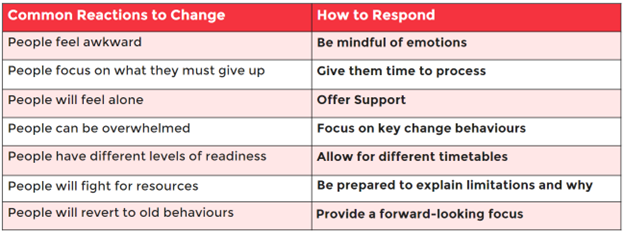If organizations don’t change, they die. It’s estimated that 70% of change projects fail in business. To succeed, we need a way to flip this script and help our people transition faster and with less stress.
As leaders, change management is our job. We need to help our people understand and engage in change. Our skills in change management, and in particular the way we communicate, are central to helping move people through change.
In this article we explore a proven approach to motivating people to change.
Successful Change Starts with People
Sometimes we assume that if we build it, they will come. Too often leaders assume that because they understand and are committed to a change, that everyone else in the organization will be too. That’s just not the case.
“People don’t resist change.
They resist being changed!”- Peter Senge
There are many emotions that come into play during change. This is called moving through the change valley which starts with feelings of uncertainty, discomfort, stress, and confusion. Those feelings can tempt us to go back to the status quo. At the mid way point we can feel awkward and inadequate as we work to gain new knowledge and skills. And it’s only when we climb out of the far side of the valley do we again start to have confidence in the new reality.

At every point on this journey, people need personal motivation to change. All the inspiring speeches and flag waving in the world won’t get employees to buy into change until they have the personal motivation to do so. People won’t change for your reasons; they will only change for their own reasons.
So how can leaders help people find and act on these motivations?
Using Motivational Interviewing
Motivational interviewing is a counseling approach that was developed to help people change behavior. It is a collaborative, person-centered approach that focuses on the individual's motivation and readiness to change. The aim of motivational interviewing is to help the individual identify their own reasons for change and to support their efforts to make positive changes.
Motivational interviewing is based on four principles:
- Expressing Empathy
- Developing Discrepancy
- Rolling with Resistance
- Supporting Self-efficacy
Motivational interviewing can be used in an organizational context to influence change. By applying the principles of motivational interviewing, managers and leaders can help employees identify their own reasons for change and develop a plan to make positive changes.
Expressing EmpathyThe first principle of motivational interviewing is expressing empathy. This involves showing understanding and compassion towards the employee's perspective. By expressing empathy, managers and leaders can create a safe and supportive environment where the employee feels heard and understood. This can help build trust and rapport between the manager and the employee.
Developing DiscrepancyThe second principle of motivational interviewing is developing discrepancy. This involves helping the employee identify the discrepancy between their current behavior and their goals. By helping the person identify this discrepancy, managers and leaders can help motivate the employee to make positive changes in their behavior.
Rolling with ResistanceThe third principle is rolling with resistance. This involves avoiding arguments or confrontations with the employee. Instead, the manager or leader should acknowledge the employee's resistance and work with them to find solutions to overcome it. By rolling with resistance, managers and leaders can help employees feel heard and supported, which can help build motivation and commitment to change.
Supporting ConfidenceThe fourth principle of motivational interviewing is supporting confidence. This involves helping the employee build self-reliance in their ability to make changes. By supporting them in this way, managers and leaders can help employees overcome barriers and obstacles that may be preventing them from making the changes needed.
Oly Boersma outlines the Motivational Interviewing Approach
In conclusion, motivational interviewing is a useful approach that can be used to influence change in an organization. By applying the principles of motivational interviewing, managers and leaders can help employees identify their own reasons for change and develop a plan to make positive changes in their behavior. Expressing empathy, developing discrepancy, rolling with resistance, and supporting self-efficacy, are the four principles of motivational interviewing that can help managers and leaders create a supportive and motivating environment that encourages positive change.
Leaders as Change Agents
All leaders are change agents. They must continuously help their organizations move towards their vision. And every step on this journey is a change project.
In addition to communication techniques like motivational interviewing, leaders can apply other strategies to positively influence change in their organizations. These include skills training, providing resources and work aids, rewarding change leaders, and harnessing the power of peer pressure.
If you’d like to learn more about how to manage change in your company, or other ways you can take the simpler path to creating a great business, connect with us or consider attending one of our upcoming leadership events.



